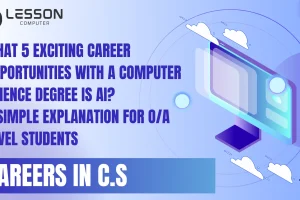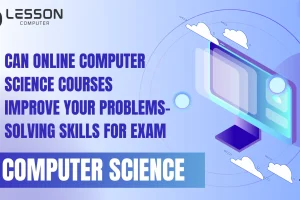
How To Get A and A* In Computer Science O Level – Expert Guide!
To receive an A and an A* in computer science studying hard, requires effort, a well-planned study, and a deep understanding of theoretical concepts and useful skills. You need a solid grip on data structures, algorithm design, arrays and lists, functions, procedures skills, and other related ideas to avoid making mistakes on exam day.
This article will explore “How to get an A & A* in computer science o level” providing some tips to be good in both the theoretical and practical work of the subject.
Some Tips to Achieve A and A* in O-level Computer Science:
The O-level Computer Science exam format can indeed be hard, but it is possible with the proper strategy and preparation.
Some tips are the following:
- Understand the Syllabus
- Master the Basics of Programming
- Create a Study Schedule
- Work on Past Papers
- Utilize Online Resources
- Clarify Doubts Early
- Stay Consistent and Confident
1. Understand the Syllabus:
A syllabus is a document that figures out everything that will be covered in a class. A syllabus for World Domination 101 includes strategies for brainwashing the masses, creating an army on a budget, preparing complete confidence, and so on.
The four basic parts are:
- Trainer information: Near the top, you will find the name of your trainer, their contact information, and office hours.
- Reading materials and supplies: This part of the section lists books, online supplies, and other content you will need for class. More tools, like a calculator or important software, will be listed here. Usually, there is a note about which data are required and which are recommended.
- Policies: The document should outline how you will be classified, the attendance requirements, and how the professor expects students to behave. This section may also include great university rules on academic honesty and respect, or how students with conditions can request support.
- Class schedule: This section covers when assignments are required, when tests will be given, and all coursework for the class, including in-class assignments essays, homework, assessments, and labs.
2. Master the Basics of Programming:
Programming tells a computer what to do. while we use many different coding languages, a computer can only speak a single language of machine language or object code. Object code is written in binary, which is a string of ones and zeros that doesn’t look like a language we would recognize.
3. Create a Study Schedule:
Preparation is very fine in exams, which means making a schedule so that you can study data over time not before the night before an exam. The best benefit of a study plan is that you will be put in order. Once you have got everything scheduled, you will find:
- You will be across your schedule and can plan ahead
- It breaks the study load into achievable amounts
- You will have time to complete assignments and ensure they are not raced.
4. Work on past papers:
while past papers will possibly carry questions different from the ones you will study for your real exam, you can still learn a lot from them. Check out our tips for how to make the most of your past paper.
- Practice: Look at every question in the past paper and think about what it is asking you to do and which keywords are used and then think about how you should answer it. Become close to everything on the paper and practice as many past papers as possible.
- Download past papers: You will be able to find and download past papers on your exam board’s website. Doing lots of past papers will help you become close to the type and style of questions that may be asked on your exam. If you are not sure how to get past the paper so, ask a teacher.
- Check with your teacher about specification changes: While past papers can be a mine of useful information, some of them may no longer be relevant. Work with your teacher to make sure you know if there will be any changes from the previous year’s exams so you know what to focus on.
5. Utilize online resources:
Online assets refer to the documents, materials, and information available on the Internet or World Wide Web. The words web resources, digital resources, and e-resources are often used interchangeably to describe the same concept. These are assets accessible via the internet, such as documents, videos, databases, or software. The idea of online resources is essential to the structure of the web and typically includes anything identified by a Uniform Resource Locator (URL).
6. Clarify doubts early:
If you don’t understand a concept, search for help immediately. It is important to mark any confusion to make sure you stay on track with your studies.
Here are some steps to get help:
- Ask your teacher: Teachers are precious resources they understand the syllabus and know exactly what examiners are looking for. Don’t hesitate to ask them for an explanation when you are stopped.
- Study groups: create a group with your classmates to discuss difficult concepts, share knowledge, and solve problems together.
7. Stay consistent and confident:
It is key when it comes to practicing Computer Science at the O Level. Regular study sessions, a good revision plan, and a lot of practice will keep you ahead of the game.
- Redefine confidence in yourself.
- Refocus from skills to abilities.
- Create and use your anchor story.
- Stop preparing and take action.
- Learn from what you consider ‘failure.’
Best Online Computer Science Degree Programs?
Explore the best online computer science degree programs. Online learning it easy for students to get a computer science degree with the help of their own house. These programs are planned for those who want flexibility while still getting valuable skills in coding, data science, software development, and more. Below are some of the top online computer science degree programs that can help you build a successful career in technology.
1. University of the People:
University of the People is a free education, recognized an online university. It offers a Bachelor of Computer Science that covers basic computer science concepts, data analysis, and programming.
Key Points:
- 100% online and self-study.
- No teaching fees, but there are small management fees.
- Recognized by the Distance Education Accrediting Commission in the USA.
2. Southern New Hampshire University (SNHU):
Southern New Hampshire University (SNHU) offers an online Bachelor of Computer Science. The focal point of the program on software engineering, data structures, IT, and algorithms.
Key points:
- Fully online with easy schedules.
- Recognized New England Commission of Higher Education (NECHE).
- Offers career support and networking lucky chance.
3. Arizona State University (ASU) Online:
Arizona State University (ASU) Online offers a Bachelor of Software Engineering, which is closely range to computer science. The program focuses on software development, cybersecurity, and programming languages.
Key Features:
- Highly ranked online program in the U.S.
- Cooperative learning environment.
- Recognized by the Higher Learning Commission (HLC).
4. Oregon State University (OSU) Ecampus:
Oregon State University (OSU) Ecampus offers a post-undergraduate online computer science degree that is ideal for those who already have a degree in another field.
Key Points:
- 100% online.
- Essay start dates and increased options.
- Recognized by the Northwest Commission on Colleges and Universities.
5. University of Illinois Springfield (UIS) Online:
University of Illinois Springfield (UIS) offers an online Bachelor of Science in Computer Science that covers basic subjects like programming, operating systems, and algorithms.
Key Features:
- Fully online.
- importance of software development and cybersecurity.
- Recognized Higher Learning Commission (HLC).
What are the O-level requirements for Computer Science?
To study Computer Science at the O level, students need at least five credit passes. These must include English Language, Mathematics, and Physics, along with two other science subjects. Meeting these requirements helps students build a solid foundation for higher-level computer science education and career opportunities.
What rank is required for computer science?
To secure admission into top Computer Science programs at IITs in India, students need a high rank in the JEE Advanced exam. For prestigious IITs like IIT Bombay or IIT Delhi, a rank within 300 to 800 is usually required.
However, newer IITs may accept candidates with ranks above 4500. To even qualify for IITs, students must achieve a score between 85-95 percentile in JEE Main and at least 250 or more in JEE Advanced. For better chances of securing a Computer Science seat, it is recommended to aim for a score between 280 to 300+ in JEE Advanced. Consistent preparation and strong conceptual understanding are key to achieving these competitive
What is the GPA for CS?
The required GPA for Computer Science programs varies by institution. Generally, a GPA of 3.0 to 3.5 (on a 4.0 scale) is considered good for admission into most universities. However, for top-tier universities or competitive programs, a GPA of 3.7 or higher may be needed.
Maintaining a high GPA is essential, as it reflects your academic performance and can improve your chances of getting internships, scholarships, or jobs in the field of Computer Science.
How do you pass the O-level?
To pass O Level exams, follow these tips:
- Practice with past papers to get familiar with the exam format and question types.
- Create quizzes and exercises to test your understanding of key concepts.
- Join study groups for collaborative learning and practice sessions.
- Take mock exams to improve time management and exam techniques.
- Focus on difficult topics by practicing them repeatedly until you feel confident.
what are the good marks in O-levels?
O Level exams are set and marked by the University of Cambridge Local Examinations Syndicate (UCLES). The grading and standards are determined in collaboration with the Singapore Examinations and Assessment Board (SEAB) and the Ministry of Education (MOE). Each subject is graded on a scale from A+ to U, with A+ (90-100%) being the highest and U (Ungraded) being the lowest. This system ensures fair and consistent evaluation across all subjects for students taking O Level exams worldwide.
FAQ’s:
Getting a bachelor’s degree in computer science online normally needs about 120 credit hours, and many students complete that exercise in about four years. An online MS in Computer Science no GRE, it may take you 2 years to earn the needed credits — generally around 60 credit hours. master’s programs are very long but typically take at least 3 years.
An Online Bachelor in Computer Science teaches students about coding, programming, and software development through online classes. It allows pliant learning from anywhere and prepares students for features in areas like software development, IT, and data analysis.
Custom writing and correct code daily. Use coding challenges, past exam questions, and online coding platforms to improve. Make sure you understand how to write clean, logical code.
Past papers are very important they help understand the exam pattern, question method, and time management. The more past papers you practice, the more familiar you will be with what to expect on exam day.
There are many online resources such as coding classes, video lessons, corporative questions, and forums where you can ask questions. Websites like Khan Academy, W3Schools, and Codecademy can be helpful.
Conclusion:
To get an A or A* in O Level Computer Science, you need compatible effort, a grip on key ideas, and strong programming skills. Target on mastering the syllabus, practicing past papers, creating a study schedule, and using online resources. Stay confident, explain doubts early, and keep practicing to improve both theoretical and practical knowledge.
Discover more from Lesson Computer
Subscribe to get the latest posts sent to your email.



